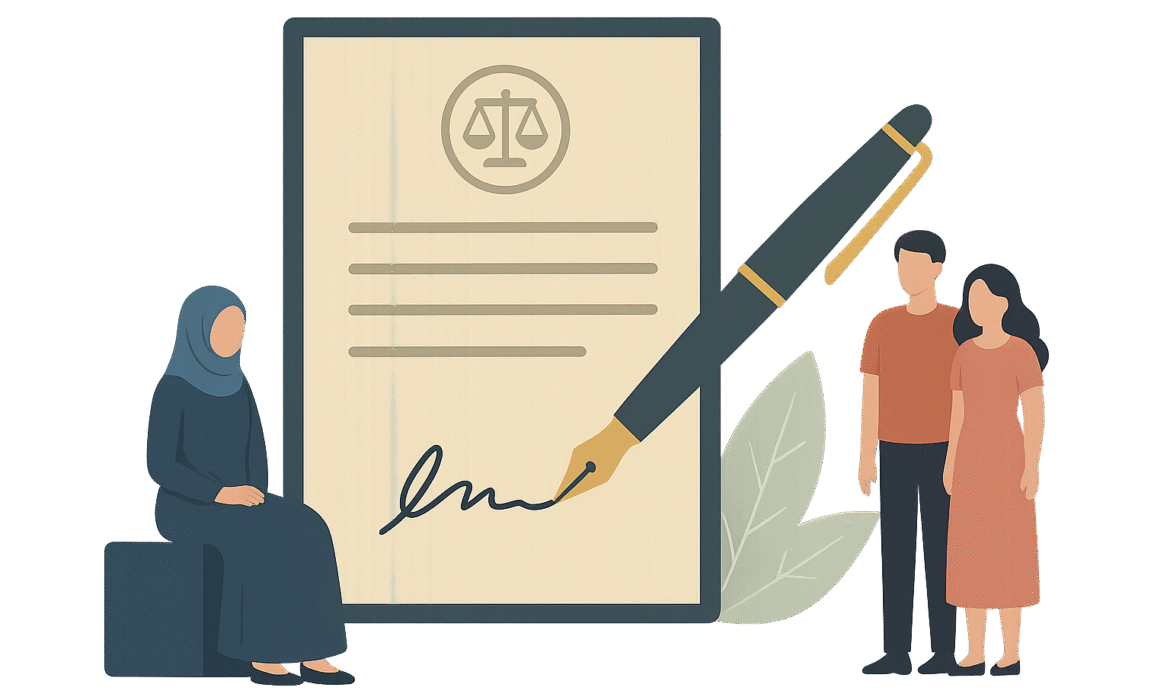Heirs And Beneficiaries in the Context of Islamic Wills in Australia
- Go Lawyers
Heirs And Beneficiaries Explained
Understanding the intricacies of Islamic inheritance can seem daunting, especially within a non-Islamic country like Australia. However, for Muslims living in Australia, it is crucial to align their wills with Islamic law to ensure that their assets are distributed according to their faith.
In Islamic tradition, estate planning is not merely a personal preference—it’s a religious obligation. For Australian Muslims, drafting Islamic wills ensures the faithful distribution of assets, honours divine injunctions, and maintains legal enforceability within Australia’s secular legal framework.
Knowing who qualifies as Heirs and Beneficiaries under Sharia principles, and how to allocate bequests legally in Australia, is crucial. This article will walk you through the rules, responsibilities, and practical steps involved in preparing a Sharia-compliant will that withstands both religious and legal scrutiny.
QUR’ANIC RULES ON INHERITANCE
Islamic wills must follow fixed share distributions outlined in Surah An-Nisa to ensure religious and legal validity.
WHAT IS THE WASIYYAH?
This optional one-third of the estate can be used for charitable gifts or to benefit non-heirs—without infringing on obligatory shares.
MANAGING COMPLEX FAMILY DYNAMICS
Islamic estate planning helps navigate stepchildren, adopted children, and blended families while staying Shariah-compliant.

The Islamic Law of Inheritance
An Islamic will, or ‘wasiyyah’, is a legal document that dictates how a Muslim’s estate should be distributed after their death under Islamic law, or Sharia. This is not merely a cultural preference but a religious duty for Muslims. The Quran provides specific guidelines on how a Muslim’s wealth should be divided among heirs and beneficiaries.
Inheritance in Islam follows a divinely ordained structure, as revealed in Surah An-Nisa (4:11–12, 176). Islamic inheritance rules are designed to ensure fairness and justice in the distribution of a person’s assets. Unlike many Western inheritance systems, Islamic law offers a detailed framework that outlines fixed shares for certain heirs, such as spouses, children, and parents.
This helps to prevent disputes and ensures that each family member receives their rightful share.
Who Are the Heirs and Beneficiaries?
Faraid: The Lawful Recipients of an Estate. Heirs and beneficiaries in Islamic law are divided into fixed sharers and residuary heirs, with specific entitlements based on their relationship to the deceased. The most common heirs and beneficiaries include spouses, children, parents, and sometimes siblings and grandparents. Their entitlements are strictly calculated to preserve fairness and avoid disputes.
The Discretionary One-Third: Bequests Outside Faraid
An Islamic will allows up to one-third of the estate to be distributed at the testator’s discretion through a wasiyyah. This portion may go to non-heirs, charitable causes, or stepchildren who are not entitled to fixed shares. However, this must not infringe upon the Qur’anic shares owed to rightful heirs and beneficiaries.
- let’s navigate your path forward together.
Confused About Heirs and Beneficiaries? We’ll Help You Get It Right.
Get clear, Shariah-compliant advice from experts in Islamic wills. Protect your estate and honour your obligations to rightful heirs and beneficiaries.
Avoiding Invalid Gifts and Disqualified Beneficiaries
Islamic rules prohibit giving bequests to certain individuals—such as non-Muslims or heirs who already have a fixed share—from the wasiyyah portion.
To ensure the validity of your Islamic will, all beneficiaries must be verified against eligibility criteria, and gifts that conflict with Islamic obligations must be removed or adjusted automatically.
Addressing Complex Family Structures
Stepchildren and adopted children are not considered automatic heirs and beneficiaries under Islamic law, but may be included in the discretionary third.
Careful structuring in the Islamic will allows for their support while preserving the mandatory shares of lawful heirs. Likewise, non-Muslim family members must be provided for without breaching Shariah guidelines.
Choosing the Right Executor and Guardian
Executors must be trustworthy, over 18, and ideally practising Muslims familiar with inheritance rules.
A dual executor model—one family representative and one legal professional—ensures smooth implementation of the Islamic will and prevents missteps that could affect rightful heirs and beneficiaries.
The Distribution Process from Death to Settlement
A well-drafted Islamic will guides the entire estate distribution process—from paying off debts and funeral expenses, to allocating the wasiyyah and mandatory shares.
An executor ensures each phase is handled in compliance with both Islamic teachings and Australian law, offering peace of mind to the testator and clarity to heirs and beneficiaries.
Handling Overseas Assets and Jurisdictional Challenges
For Muslims with assets in multiple countries, it is critical to understand how local laws interact with Islamic inheritance principles.
Partnering with legal professionals experienced in resealing foreign grants of probate ensures that all heirs and beneficiaries receive their rightful shares, whether assets are in Sydney or Saudi Arabia.
The Benefits of Legal and Scholarly Collaboration
This dual-approach safeguards against doctrinal and statutory errors, ensuring your heirs and beneficiaries receive what is owed to them with minimal legal risk and spiritual assurance.
Conclusion
Creating an Islamic will in Australia requires careful consideration of both Islamic and Australian inheritance laws. By understanding the key concepts of Islamic inheritance and seeking expert legal advice, you can ensure that your will is both religiously compliant and legally valid. This not only fulfills a religious obligation but also provides peace of mind for you and your family.
- Expert Mediation Services
Find Resolution, Not Conflict
Disputes don’t have to lead to lengthy court battles. At Go Lawyers, our mediation lawyer services provide a practical and efficient way to resolve conflicts. Our experienced team fosters constructive dialogue to achieve fair and mutually beneficial outcomes, whether it's family mediation, business disputes, or transactional issues.
Let us guide you toward a solution that prioritises your interests while preserving relationships.
- Why Choose Go Lawyers?
Professional Lawyers who offer a fixed, fair price
Whether you are an individual, a business owner, or part of a giant corporation, our experienced team delivers solutions that protect your interests and drive results. From drafting contracts and negotiating agreements to resolving disputes through mediation or litigation, we handle every aspect of your legal needs professionally and carefully.
We understand the importance of clear communication and cost-effective services, so we prioritise transparency and efficiency. Our team possesses expertise in risk management, compliance, and the resolution of commercial disputes, allowing you to depend on us as a reliable partner throughout the entire process.
